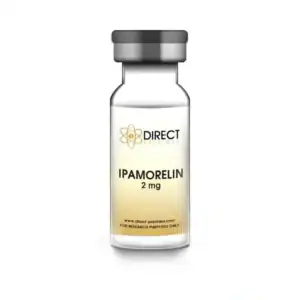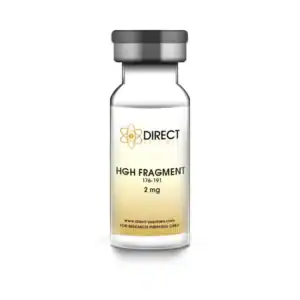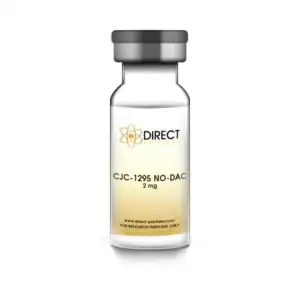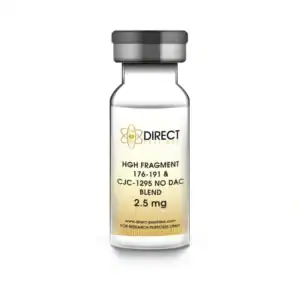HGH Fragment 176-191 is a part of Human Growth Hormone (HGH). It comes from the tail end of HGH, made up of amino acids 176-191. This part of HGH is thought to be responsible for burning fat.
Scientists developed HGH Fragment 176-191 to help reduce body fat. It works by copying how natural HGH manages fat metabolism. However, unlike regular HGH, it does not affect insulin sensitivity or muscle growth. This means it targets fat cells directly to help slim the body without raising blood sugar or causing hyperglycemia.
Besides helping with fat loss, HGH Fragment 176-191 may have anti-aging effects since HGH levels naturally decrease with age. But more research is needed to understand all its benefits.
HGH Fragment 176-191 is a modified form of amino acids 176-191 from the HGH molecule. Unlike full HGH, this fragment doesn’t stimulate cell growth, focusing instead on fat breakdown for energy. It’s safer than HGH for weight loss due to its targeted action.
HGH Fragment 176-191 peptide from Direct Peptides Europe, a modified form of the Human Growth Hormone, has been associated with a number of potential benefits.
Its main benefit is that it boosts fat burning without changing blood sugar levels or causing high blood sugar. This leads to more energy being used. It works like natural HGH, which controls fat metabolism by focusing on and breaking down fat cells in adipose tissue.
Unlike regular HGH, the HGH Fragment 176-191 peptide doesn’t cause growth or change how insulin works in the body. This unique feature makes it a safer option for research focused on the fat-burning effects of HGH without the risk of side effects.
Europe Studies suggest HGH Fragment 176-191 may influence fat metabolism in laboratory settings when paired with controlled variables such as diet and activity.
Some research suggests that HGH Fragment 176-191 could have anti-aging benefits due to its origin from the Human Growth Hormone, which naturally decreases with age.
HGH Fragment 176-191, a modified form of the Human Growth Hormone, is lauded for its potential fat-burning benefits. However, like any supplement, it can also have side effects that researchers should be aware of.
Reported side effects include headaches, fatigue, and lethargy. These symptoms can be mild or more severe depending on the individual’s response to the peptide. Other potential side effects include dizziness and nasopharyngitis.
One of the most common side effects is irritation at the injection site. This can include redness, itching, or swelling and is typically a result of the body reacting to the injection. In some cases, researchers have observed hypoglycaemia.
In rare cases, HGH Fragment 176-191 has been linked to higher cholesterol levels. Some studies have also reported tingling or numbness in the skin. These effects are uncommon and may depend on dosage and individual factors.
Explore Peptide Supplies at Direct Peptides for all your reconstitution requirements.
In addition to HGH Fragment 176-191, peptides such as Ipamorelin and CJC No DAC have garnered interest in research for their diverse applications.
Ipamorelin is a growth hormone-releasing peptide (GHRP) that stimulates the release of growth hormone (GH) from the pituitary gland. It demonstrates high selectivity, minimizing undesired hormonal effects.
Growth Hormone Studies: Ipamorelin is widely used in research exploring growth hormone effects.
Muscle Recovery and Wasting: It is being researched for its role in muscle repair and mitigating muscle atrophy.
For more information visit the Ipamorelin Category Page.
CJC No DAC is a shorter-acting version of CJC-1295. It is used to stimulate the release of growth hormone without extended binding.
Often paired with other peptides like Ipamorelin, it enhances results in research.
Natural GH Pulses: This peptide encourages natural growth hormone secretion patterns, making it a valuable research tool.
Wide Range of Applications: CJC No DAC is explored for its role in metabolism, tissue regeneration, and recovery studies.
For more information visit the CJC No DAC Category Page.
Enhance your research with our exclusive Triple Blend Peptide Formulas, designed for optimal fat burning, growth hormone regulation, and muscle recovery:
Research on the effectiveness of HGH Fragment 176-191 has shown some interesting results. This peptide, a small part of the Human Growth Hormone (HGH), is recognized for its potential in burning fat and promoting weight loss by increasing energy expenditure.
A study published in the American Journal of Physiology found that this peptide might have a hyperglycemic effect. This means it can regulate fat metabolism without causing high blood sugar. This effect is especially valuable for addressing obesity and related weight gain [3].
In another study, Heffernan M observed that the addition of the HGH Fragment 176-191 enhanced the therapeutic efficacies of numerous drugs, including the clinical chemotherapeutic doxorubicin. The peptide was shown to reduce the potent toxicity and inefficient tumor targeting commonly associated with doxorubicin.
Using novel delivery techniques like the loading of inert drug carriers, researchers minimized the deleterious effects and clinical side effects of the drug. Molecular docking simulations revealed how the fragment improved targeting of the MCF-7 breast cancer cell line, highlighting its impact at the molecular level (measured in nm concentrations) as noted in PMID 35783198 [4].
Further Europe studies examined the peptide’s effect on lipid metabolism. One study reported that an orally administered synthetic version of the fragment influenced lipid processing in rodents, demonstrating potential for managing fat storage and energy expenditure [5].
A review article also emphasized that HGH Fragment 176-191 not only supports weight loss but also has anti-aging effects. Additionally, the fragment appears to have potential in managing blood sugar levels, further supporting its role in metabolic health.
Recent findings hint that HGH Fragment 176-191 could be used to treat diabetic ulcerations. The peptide’s role in addressing such chronic conditions may contribute to broader therapeutic approaches for malignancies and other metabolic disorders.
While these results are promising, further research (including studies at both the mg and nm scale) is necessary to fully understand the benefits and limitations of HGH Fragment 176-191.
HGH Fragment 176-191, Ipamorelin, and CJC No DAC are invaluable tools in Europe peptide research. Their unique properties allow for focused studies in fat metabolism, growth hormone regulation, and metabolic health. Continued research will expand the understanding of their mechanisms and potential applications.
[1] Ng FM, Bornstein J. Hyperglycemic action of synthetic C-terminal fragments of human growth hormone. Am J Physiol. 1978 May;234(5):E521-6.
[2] Habibullah MM, Mohan S, Syed NK, Makeen HA, Jamal QMS, Alothaid H, Bantun F, Alhazmi A, Hakamy A, Kaabi YA, Samlan G, Lohani M, Thangavel N, Al-Kasim MA. Human Growth Hormone Fragment 176-191 Peptide Enhances the Toxicity of Doxorubicin-Loaded Chitosan Nanoparticles Against MCF-7 Breast Cancer Cells. Drug Des Devel Ther. 2022 Jun 27;16:1963-1974.
[3] Lim N, Ng FM, Wu ZM, Ede N, Hearn MT. Hypoglycemic action of a novel constrained analog of human growth hormone-(6-13). Endocrinology. 1992 Aug;131(2):835-40.
[4] Heffernan MA, Jiang WJ, Thorburn AW, Ng FM. Effects of oral administration of a synthetic fragment of human growth hormone on lipid metabolism. Am J Physiol Endocrinol Metab. 2000 Sep;279(3):E501-7.
Shop ALL Peptide Vials from Direct Peptides today, your trusted supplier of premium clinical grade peptides online.
No. AOD-9604 is a modified peptide derived from the same C-terminal region of human growth hormone as HGH Fragment 176-191, but it is not identical. AOD-9604 includes structural changes designed to improve stability and activity. Research on AOD-9604 is more extensive than on the unmodified 176-191 fragment.
The current scientific literature does not show direct activation of the AMPK pathway by HGH Fragment 176-191. Studies focus on its lipolytic effects rather than on intracellular energy sensing pathways such as AMPK. While AMPK plays a major role in fat metabolism, no peer reviewed evidence supports the claim that this peptide directly stimulates AMPK signaling.
Preclinical studies suggest that peptides derived from the HGH 176-191 region can increase lipolysis and fat oxidation in animal models. These effects may indirectly influence lipid metabolism markers. However, published research has not confirmed consistent changes in lipid oxidation markers, especially for the unmodified fragment and human data remains limited.
Scientific studies do not demonstrate a direct effect of HGH Fragment 176-191 on appetite, or satiety regulation. Research focuses on fat metabolism rather than central hunger pathways. In animal models, changes in food intake were not consistently observed, suggesting the peptide does not directly influence appetite control mechanisms.
Animal studies show that peptides from the HGH 176-191 region can reduce fat mass and increase fat breakdown under controlled conditions. However, no well controlled human studies confirm that the unmodified HGH Fragment 176 191 produces reliable weight loss outcomes. Current evidence supports its role in metabolic research rather than established weight-loss applications.

BULK BUY
Ipamorelin Peptide Vial
£12.38 – £77.15Price range: £12.38 through £77.15 Select options This product has multiple variants. The options may be chosen on the product page
BULK BUY
HGH Fragment 176-191 Peptide Vial
£18.74 – £212.57Price range: £18.74 through £212.57 Select options This product has multiple variants. The options may be chosen on the product page
BULK BUY
CJC-1295 No-Dac
£18.74 – £224.30Price range: £18.74 through £224.30 Select options This product has multiple variants. The options may be chosen on the product page
HGH Fragment 176-191 CJC-1295 no DAC
£21.08 – £30.06Price range: £21.08 through £30.06 Select options This product has multiple variants. The options may be chosen on the product pageALL CONTENT AND PRODUCT INFORMATION AVAILABLE ON THIS WEBSITE IS FOR EDUCATIONAL PURPOSES ONLY.
DISCLAIMER: These products are intended solely as a research chemical only. This classification allows for their use only for research development and laboratory studies. The information available on our Europe Direct Peptides website: https://direct-peptides.com is provided for educational purposes only. These products are not for human or animal use or consumption in any manner. Handling of these products should be limited to suitably qualified professionals. They are not to be classified as a drug, food, cosmetic, or medicinal product and must not be mislabelled or used as such.